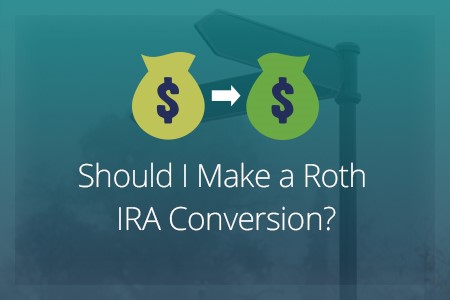There are a number of reasons why you should strongly consider converting part or all of your traditional IRA or 401k accounts into a Roth IRA. The Covid shutdown economy this year adds to the list.

Here are some the reasons to do a Roth Conversion:
- If your investment portfolio is in a loss position this year, any tax hit you incur as a result of the Roth conversion would be offset by the investment losses. This looked like an appealing aspect of the weak stock market earlier this year but as the year has gone on and the markets have recovered, there probably aren’t as many investment losses to be taken advantage of.
- If you have been laid off or your Adjusted Gross Income for 2020 will otherwise be lower than expected, then perhaps the income that you book by doing a Roth conversion may not hurt you as much this year and may not cause your taxes to increase substantially. You can “take advantage” of this off year in your own income by paying taxes now on your traditional retirement fund cash and thereby minimize taxes you might have to pay at a later date during your retirement.
- Speaking of which, you might have read that there will be a new President next year. As a result of the new administration, and as a result of the explosion in government spending in 2020 in an effort to keep the economy together as a result of the coronavirus economy, do you believe your taxes going forward are more likely to go up or go down? If you agree that taxes are more likely to go up, then it is advantageous for you to convert your IRA to a Roth now rather than later at a higher tax rate.
- Roth IRAs have no Required Minimum Distributions and are not taxable to the owner if the owner has held the Roth account for at least 5 years. (Roth 401k’s do have RMD requirements). Compare that with traditional IRA and 401k accounts, which are taxable as ordinary income and which have strict RMD requirements. Though it is more painful (tax-wise) to do a Roth at the front end, the Roth is much better at the withdrawal end.
- You don’t have to convert 100% of your traditional retirement account at once. You can stage your conversion over a number of years, or just convert a part of it and leave the rest alone.
- If you are over 59 1/2 years old, you don’t have to pay the 10% penalty on the portion that you convert – just ordinary income on that part.
- You don’t have to pay the IRS from your traditional retirement account money. In other words, whatever your traditional retirement account balance is pre-conversion, it can be the same balance after you convert it to a Roth, as long as you have enough money elsewhere to pay the additional taxes you incur by doing the conversion. Keep in mind, converting a traditional retirement to a Roth IRA is equivalent (from a tax perspective) to withdrawing the money from the traditional account, meaning it is treated as ordinary income to you.
- Do some analysis prior to converting. Look at the Federal and State (if appropriate) tax tables. If, by doing a conversion, you force yourself into a significantly higher tax bracket, then don’t convert, or convert a smaller amount.
- Unlike setting up or contributing directly to a Roth IRA, there are no income limits on doing a Roth conversion. This “backdoor” way of having a Roth IRA is explicitly legal because it raises more money for the IRS in the short term.
IMO
If you are heading into retirement, and especially if you are over 59 1/2 years old, you should certainly analyze and strongly consider doing a Roth conversion. I am afraid that taxes will have to be raised significantly in order to pay for what government has had to do to keep the economy from imploding this year. Any tax money you can spend now that saves you from spending money when you need it in retirement is a good idea.
